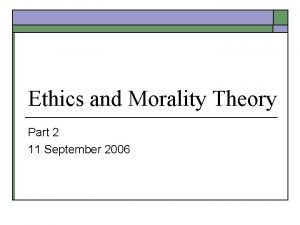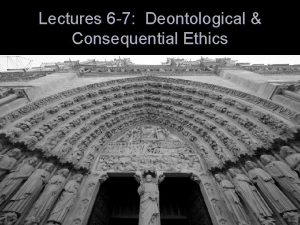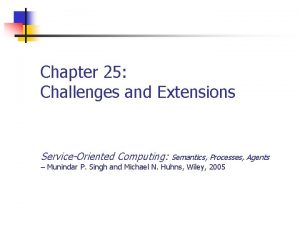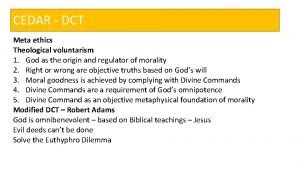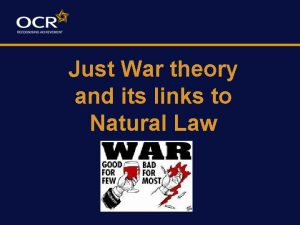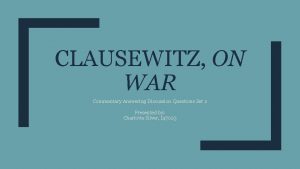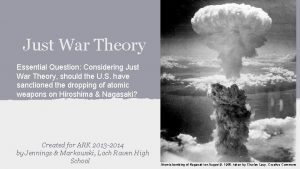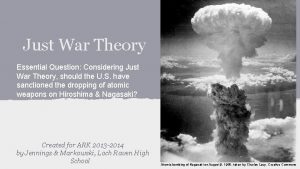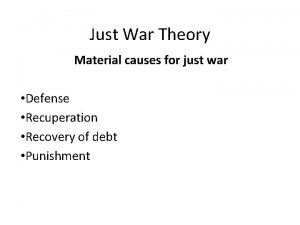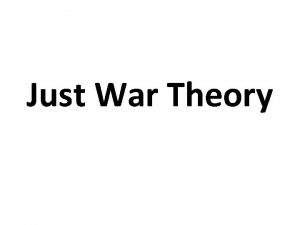Just War or the Ethics of War Clausewitz














- Slides: 14

Just War or the Ethics of War - Clausewitz said “war is a continuation of politics by other means” - war can also create policy - war is a brutal and ugly enterprise - central to human history and social change - war and its threat continue to be forces in our lives The Rules of War

War forces us to confront important questions - Is war always wrong? - Might there be situations when it can be a justified, or even a smart, thing to do? - Will war always be part of human experience, or can we do something to make it disappear? - Is war an outcome of unchangeable human nature or, rather, of changeable social practice? - Is there a fair and sensible way to wage war, or is it all hopeless, barbaric slaughter? - When wars end, how should post-war reconstruction proceed, and who should be in charge? - What are our rights, and responsibilities, when our own society makes the move to go to war?

Realism -skeptical about applying morality or justice to war - morality is wishful thinking - power and national security motivate states during wartime - country should tend to its vital interests in security, influence over others, and economic growth - war is an inevitable part of an chaotic world system - Machiavellian perspective – do what is necessary to stay in power Niccolò Machiavelli Some realists claim that there could be rules – no genocide, harm to noncombatants, etc

Pacifism - morality can be applied to international concepts - objects to the mass killing for any reason, which is part and parcel of the wartime experience - therefore war should never be undertaken because it is always wrong “What difference does it make to the dead, the orphans and the homeless, whether the mad destruction is wrought under the name of totalitarianism or the holy name of liberty or democracy? ” - Mahatma Gandhi

“For make no mistake: evil does exist in the world. A non-violent movement could not have halted Hitler’s armies. Negotiations cannot convince al Qaeda’s leaders to lay down their arms. To say that force is sometimes necessary is not a call to cynicism - it is a recognition of history; the imperfections of man and the limits of reason. ” - Barack Obama Is Pacifism naïve or possible? President Barack Obama accepting the Nobel peace Prize, December 10, 2009

Just War Theory - Just War is most influential school of thinking in the ethics of war - early thinkers include Aristotle, Cicero, Augustine, Hugo Grotius, etc. - states can have moral justification for resorting to armed force at times - many of the rules developed by the Just War tradition have since been codified into international laws governing armed conflict The United Nations Charter and The Hague and Geneva Conventions

Three parts of Just War Theory 1. jus ad bellum - concerns the justice of resorting to war in the first place 2. jus in bello - concerns the justice of conduct within war once it has begun 3. jus post bellum - concerns the justice of peace agreements and the termination phase of war

jus ad bellum rules before going to war six requirements to make war just before undertaking 1. JUST CAUSE - state may launch a war only for the right reason presupposes the idea that states have rights - self-defense from external attack - defense of others from such attack - protection of innocents from brutal, aggressive regimes - punishment for a grievous wrongdoing which remains uncorrected

jus ad bellum, cont. rights of states - all legitimate states have rights to political sovereignty and territorial integrity - legitimate state is recognized by its own people and the international community - legitimate state avoids violating the rights of other legitimate states - legitimate state satisfies the human rights of their own citizens - states failing any of these criteria have no right to govern or to go to war - allow legitimate states to intervene on behalf of victims

jus ad bellum, cont. Does this right allow for pre-emptive war? Or is this aggression? The bombing of Baghdad

jus ad bellum, cont. 2. RIGHT INTENTION - state must intend to fight the war only for the sake of its just cause - ulterior motives, such as a power or land grab, revenge, or ethnic hatred are not legitimate - if another intention crowds in, moral corruption sets in - international law does not include this rule because it is difficult to prove intent

jus ad bellum, cont. 3. PROPER AUTHORITY AND PUBLIC DECLARATION - decision must be made by the appropriate authorities and made public (to both citizens and enemies) 4. LAST RESORT - state may resort to war only if it has exhausted all peaceful alternatives to resolving the conflict, in particular diplomatic negotiation

jus ad bellum, cont. 5. PROBABILITY OF SUCCESS - state may not go to war if there will be no measurable change - block mass violence which is going to be futile - International law does not include this rule because it is biased against small states 6. PROPORTIONALITY - must weigh universal good v. universal bad benefits must outweigh the costs Could the United States have predicted the emerging power of Iran after the fall of Saddam Hussein?

jus ad bellum, cont. Just war theory insists all six criteria must each be fulfilled for a declaration of war to be justified or legitimate International laws do not hold the same standard President Franklin Roosevelt signing declaration of war against Germany and Japan
 Clausewitz trinity
Clausewitz trinity Carl von clausewitz
Carl von clausewitz Describe the dream that romeo has just had
Describe the dream that romeo has just had Branches of metaethics
Branches of metaethics Realism vs anti realism
Realism vs anti realism Descriptive ethics vs normative ethics
Descriptive ethics vs normative ethics Deontological ethics meaning
Deontological ethics meaning Compare micro-ethics and macro-ethics.
Compare micro-ethics and macro-ethics. Compensatory justice examples
Compensatory justice examples Teleological ethics vs deontological ethics
Teleological ethics vs deontological ethics Factual inquiry in ethics
Factual inquiry in ethics Theological voluntarism
Theological voluntarism Descriptive ethics
Descriptive ethics Methaethics
Methaethics Just war theory
Just war theory





